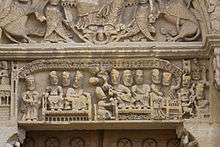Heortasius
Heortasius (fl. 358–361) was a 4th-century bishop of Sardis and attendee at the Councils of Seleucia and Constantinople. He was a proto-Catholic who was sent into exile by the Semi-Arian faction following their victory at the afore-mentioned Councils.
Councils of Ariminum and Seleucia
In 358, the Roman Emperor Constantius II requested two councils, one of the western bishops held at Ariminum and one of the eastern bishops at Seleucia, to resolve the Arian controversy over the nature of the divinity of Jesus Christ, which divided the 4th-century church.[1] The council at Seleucia was bitterly divided, and procedurally irregular, and the two parties met separately and reached opposing decisions.[2][3] Here the Anomoean faction of the Arian bishops was led by Acacius of Caesarea, a disciple of Eusebius of Caesarea, supported by George of Alexandria and particularly Uranius of Tyre who had close ties to the Emperor.
Council of Constantinople

Later that year, Constantius II called for a council in Constantinople to consider the decision at Ariminum and resolve the split at Seleucia.[2][4] Here Constantius sided with Acacius and the semi-Arians, and several bishops of opposing factions were exiled. Heortasius was deposed (officially) because he had been ordained bishop of Sardis without the sanction of the bishops of Lydia.[5][6] It seems probable however that in reality Acacius was taking the opportunity, using his imperial connections, to rid himself of long-standing enemies, especially Cyril of Jerusalem.[7]
References
- ↑ Philostorgius, in Photius, Epitome of the Ecclesiastical History of Philostorgius, book 4, chapter 10.
- 1 2 Philostorgius, in Photius, Epitome of the Ecclesiastical History of Philostorgius, book 4, chapter 11.
- ↑ Socrates Scholasticus, Church History, book 2, chapter 39.
- ↑ Socrates Scholasticus, Church History, book 2, chapter 40
- ↑ William Robertson, An attempt to explain the words: reason, substance, person, creeds, orthodoxy, Catholic-church, subscription, and Index expurgatorius: To which are added, some reflections, miscellaneous observations, quotations, and queries, on the same subjects (printed for W. Johnston, 1766) 79-81 s.
- ↑ Socrates Scholasticus, The Ecclesiastical Histories of Socrates, Sozomen, & Theodorit, Faithfully Abridg'd from the Originals, volume 1 (George Sawbridge, 1707) p215.
- ↑ Charles Joseph Hefele, A History of the Councils of the Church: from the Original Documents, to the close of the Second Council of Nicaea A.D. 787 (Wipf and Stock Publishers, 1 Feb. 2007) p 273